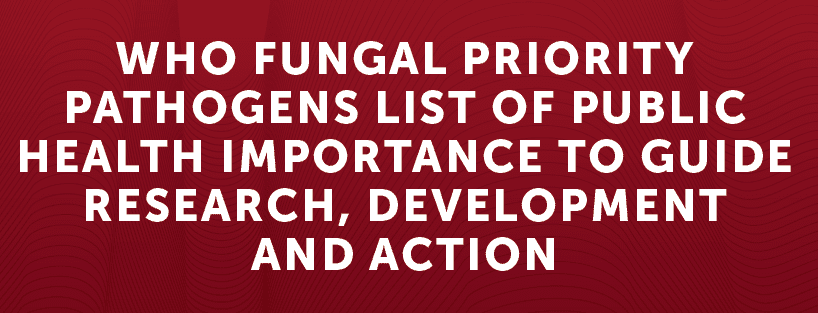
Geneva: The World Health Organization today issued its first ‘Fungal Pathogen Priority List’ with 19 different fungal species highlighted, with the aim to focus and drive further research and policy interventions and strengthen the global response to lethal or serious disease causing fungal infections and antifungal resistance.
The global leader in fungal disease advocacy, Global Action for Fungal infections (GAFFI) has been working with WHO for several years to list all the key antifungals and diagnostics on the WHO’s Essential Diagnostic and Essential Medicines Lists.
GAFFI celebrates this report with Chief Executive Professor David Denning saying:
“It has been a privilege to assist this insightful exercise with colleagues from across the world. Fungal diseases are a global threat, with gross inequity of access to life-saving diagnostics and antifungal drugs. The engagement of public health, with the integration of diagnostics in routine care, has the potential to save countless lives each year. WHO’s engagement is critical to global health improvements and addressing the growing spectre of antifungal resistance.’
Fungal diseases kill over 1.6 million people each year and cause long-term diseases in hundreds of millions more. The fungi at the top of the WHO list – so-called ‘Critical’ – were the common Candida albicans and Aspergillus fumigatus, together with Cryptococcus neoformans which causes meningitis and the multi-drug resistant Candida auris. Antifungal resistance is becoming an increasing problem in these ‘Critical’ fungi, but also in many others on the ‘High’ and ‘Medium’ priority lists.
The WHO FPPL scope is: “focused on fungal pathogens responsible for acute and subacute systemic fungal infections for which drug resistance or other treatability and management challenges exist. The pathogens included are all associated with serious risks of mortality and/or morbidity.” GAFFI’s policy brief on antifungal resistance outlines the most pressing problems.
The report articulates a clear need for an evidence base to inform public health interventions – both in terms of disease impact and improved delivery of care. For many fungal diseases, this is lacking or sketchy, especially in resource-limited countries where diagnostics are not always available.
The WHO recommends three key broad areas for action:
- improved surveillance of fungal diseases (which requires regular access to diagnostics),
- targeted support for R&D and innovation (new antifungal drugs, improved diagnostics)
- enhanced health systems (to ensure access to diagnosis, resistance detection and therapy, including a major uplift in training)
The report calls for universal access to these tests and therapies.
The WHO AMR Division was responsible for coordinating and writing the report, with expert support from the University of Sydney and an international Expert Advisory Group led by Dr Ana Alastruey-Izquierdo (Instituto de Salud Carlos III, Spain). Funding was provided by the Governments of Austria and Germany and GARDP.
Link to WHO press release: https://www.who.int/news/item/25-10-2022-who-releases-first-ever-list-of-health-threatening-fungi
Link to WHO report https://www.who.int/publications/i/item/9789240060241